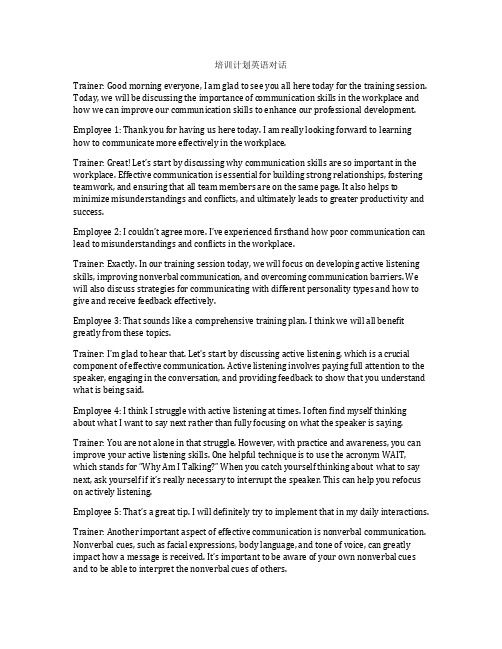社区培训课程 日常英语情景对话
英语口语日常交流场景模拟

英语口语日常交流场景模拟日常交流场景下的英语口语模拟在日常生活中,我们经常需要用英语与他人进行交流。
无论是购物、问路、还是与朋友聚会,都会涉及到各种场景下的口语交流。
本文将通过模拟几个常见的日常交流场景,并提供相应的英语口语表达,帮助你更好地应对这些情景。
场景一:购物在商场或超市里购物是我们日常生活中常见的活动。
当你需要询问某件商品的价格或寻求店员的帮助时,以下英语口语表达可以帮助你更顺利地进行交流。
1. Asking for the price:- How much does this shirt cost?这件衬衫多少钱?- Can you tell me the price of this watch?你能告诉我这块手表的价格吗?2. Asking for assistance:- Excuse me, where can I find the shoes department?不好意思,请问我可以在哪里找到鞋类部?- Could you help me with this? I can't find the size I need.你能帮我一下吗?我找不到我需要的尺码。
3. Making a purchase:- I would like to buy this dress.我想买这条裙子。
- Can I pay by credit card?我可以用信用卡支付吗?场景二:餐厅用餐无论是在咖啡馆、餐厅或者快餐店,用餐时的英语口语也是必备的。
以下是一些常见的用餐场景以及相应的英语口语表达。
1. Making a reservation:- Do you have any available tables for two at 7 pm?你们七点有没有两个人的位子?- I'd like to make a reservation for tonight, please.我想预订今晚的位置。
简单的英语情景对话

简单的英语情景对话想找一些常用简单的英语情景对话练习英语口语吗?下面店铺为大家带来简单的英语情景对话,希望对你有所帮助!简单的英语情景对话1:A:Excuse me. Where's the shop, please?A:请问一下,商店在哪里?B:The shop? Oh. Go straight on this road. Turn left at the third comer. Then you can see it.B:商店吗?哦,沿着这条街一直走,在第三个街口左转,然后就能看到了。
C:l'm walking that way. Let me lead you the way.C:我正朝那边去。
让我给你带路吧!A:Thank you very much.A:非常感谢。
C:You're welcome.C:不用谢简单的英语情景对话2:A:Excuse me. I'm afraid I got lost. Where am I on this map?A:对不起,我恐怕是迷路了,请问我在地图上的什么位置?B:We are here, bus station, we are in the heart of the city.B:我们在这里,汽车站,我们现在在市中心。
A:Oh! Can I go from here to the Zhongshan Park?A:哦!我能否从这里到中山公园呢?B:Head straight up the street about two blocks then turn right.B:顺着这条街一直走过两个街区,然后向右转。
简单的英语情景对话3:A:Excuse me. I wonder if you could help me. l'm looking for the Oriental Pearl Theater.A:对不起,打扰一下,不知您能否帮我,我在找东方之珠剧院。
基本日常生活英语口语情景对话(7篇)

基本日常生活英语口语情景对话(7篇)(经典版)编制人:__________________审核人:__________________审批人:__________________编制单位:__________________编制时间:____年____月____日序言下载提示:该文档是本店铺精心编制而成的,希望大家下载后,能够帮助大家解决实际问题。
文档下载后可定制修改,请根据实际需要进行调整和使用,谢谢!并且,本店铺为大家提供各种类型的经典范文,如工作资料、求职资料、报告大全、方案大全、合同协议、条据文书、教学资料、教案设计、作文大全、其他范文等等,想了解不同范文格式和写法,敬请关注!Download tips: This document is carefully compiled by this editor.I hope that after you download it, it can help you solve practical problems. The document can be customized and modified after downloading, please adjust and use it according to actual needs, thank you!In addition, this shop provides you with various types of classic model essays, such as work materials, job search materials, report encyclopedia, scheme encyclopedia, contract agreements, documents, teaching materials, teaching plan design, composition encyclopedia, other model essays, etc. if you want to understand different model essay formats and writing methods, please pay attention!基本日常生活英语口语情景对话(7篇)掌握好一些常用的英语口语表达,能让你的英语口语交际能力更上一层楼。
培训计划英语对话

培训计划英语对话Trainer: Good morning everyone, I am glad to see you all here today for the training session. Today, we will be discussing the importance of communication skills in the workplace and how we can improve our communication skills to enhance our professional development.Employee 1: Thank you for having us here today. I am really looking forward to learning how to communicate more effectively in the workplace.Trainer: Great! Let’s start by discussing why communication skills are so important in the workplace. Effective communication is essential for building strong relationships, fostering teamwork, and ensuring that all team members are on the same page. It also helps to minimize misunderstandings and conflicts, and ultimately leads to greater productivity and success.Employee 2: I couldn’t agree more. I’ve experienced firsthand how poor communication can lead to misunderstandings and conflicts in the workplace.Trainer: Exactly. In our training session today, we will focus on developing active listening skills, improving nonverbal communication, and overcoming communication barriers. We will also discuss strategies for communicating with different personality types and how to give and receive feedback effectively.Employee 3: That sounds like a comprehensive training plan. I think we will all benefit greatly from these topics.Trainer: I’m glad to hear that. Let’s start by discussing active listening, which is a crucial component of effective communication. Active listening involves paying full attention to the speaker, engaging in the conversation, and providing feedback to show that you understand what is being said.Employee 4: I think I struggle with active listening at times. I often find myself thinking about what I want to say next rather than fully focusing on what the speaker is saying. Trainer: You are not alone in that struggle. However, with practice and awareness, you can improve your active listening skills. One helpful technique is to use the acronym WAIT, which stands for “Why Am I Talking?” When you catch yourself thinking about what to say next, ask yourself if it’s really necessary to interrupt the speaker. This can help you refocus on actively listening.Employee 5: That’s a great tip. I will definitely try to implement that in my daily intera ctions.Trainer: Another important aspect of effective communication is nonverbal communication. Nonverbal cues, such as facial expressions, body language, and tone of voice, can greatly impact how a message is received. It’s important to be aware of your own nonverbal cues and to be able to interpret the nonverbal cues of others.Employee 6: I never realized how much nonverbal cues can impact communication. I will pay more attention to my own nonverbal communication from now on.Trainer: That’s a good star t. Being aware of your nonverbal cues can help you better understand how you are coming across to others and can also help you better interpret the nonverbal cues of your colleagues.Employee 7: I think it’s also important to be able to communicate effecti vely with different personality types. Some people may prefer direct communication, while others may prefer more subtle and indirect communication styles.Trainer: You’re absolutely right. Understanding the communication preferences of different personality types can help you tailor your communication style to be more effective with each individual. In our training session, we will discuss strategies for communicating with different personality types and how to adapt your communication style to meet their needs.Employee 8: I’m really looking forward to learning more about that. I often struggle to communicate with certain colleagues who have very different personality types from my own.Trainer: Lastly, we will discuss how to give and receive feedback effectively. Providing constructive feedback is an important part of professional growth, and being able to receive feedback gracefully and use it to improve is equally important.Employee 9: I think feedback is something that a lot of people struggle with. It can be hard to receive criticism, even if it’s well-intentioned and constructive.Trainer: I agree. However, by creating a culture of open and honest feedback, we can all benefit from each other’s insights and improve our performance. We will discuss strat egies for giving and receiving feedback in a way that is constructive and beneficial for professional development.Employee 10: This training session sounds like it will be very beneficial for all of us. I can’t wait to put these strategies into practice in my daily work.Trainer: I’m glad to hear that. I believe that by improving our communication skills, we can create a more positive and productive work environment for everyone. I look forward to our training session today and hearing about your experiences with implementing these strategies in your daily work. Thank you all for your participation, and let’s get started!。
情景对话英语日常短文

情景对话英语日常短文Dialogue is an essential part of everyday communication in English. In this short piece, we will discuss the importance of dialogue in daily life and how it can be used to improve our language skills.Dialogue is a conversation between two or more people, and it can take place in various settings, such as at home, work, school, or in public places. Engaging in dialogue helps us to express ourselves, share our ideas, and understand others better.In English, dialogue is a crucial tool for language learners to improve their speaking and listening skills. Through dialogue, we can practice using new vocabulary, grammar structures, and pronunciation. It also helps us to develop our critical thinking and problem-solving abilities.To improve our dialogue skills, we should actively seek out opportunities to engage in conversations with native speakers or other language learners. We can also watch movies, TV shows, and listen to podcasts to expose ourselves to different accents and speech patterns.In conclusion, dialogue is a vital part of our daily lives and an essential tool for language learners. By practicing our dialogue skills, we can improve our communication abilities and connect with others on a deeper level.。
日常英语口语对话练习

日常英语口语对话练习大家好,今天我给大家准备了一些日常英语口语对话练习。
这些对话将涵盖日常生活中常见的情景和话题,帮助我们提高口语表达能力和交流技巧。
让我们一起来进行练习吧!1. 在餐馆点餐情景:你和朋友来到一家新开的餐馆用餐,你们想点一些菜品。
对话:你:Excuse me, could we have a menu, please?服务员:Of course, here you are.你:Thank you. Could you recommend any specialties?服务员:Our chef's specialties are the grilled salmon and the homemade pasta. They are very popular among our customers.你:Sounds delicious! We'd like to try both of them. And could we also have some appetizers, please?服务员:Sure, we have a variety of appetizers to choose from. Would you like me to make some recommendations?你:Yes, please. What do you recommend?服务员:The bruschetta and the spinach dip are both very good choices. Would you like anything else?你:No, that's all for now. Thank you.2. 在商场购物情景:你在商场里看到一件喜欢的衣服,你想试穿并了解价格。
对话:你:Excuse me, could you help me? I'm interested in this dress. Do you have it in my size?售货员:Certainly, what size do you usually wear?你:I usually wear a medium. Do you have it in a medium size?售货员:Let me check for you. Yes, we do have one in a medium size. You can try it on if you'd like.你:Great, thank you. By the way, could you tell me the price of this dress?售货员:It's priced at $50.你:Hmm, I really like it. I think I'll take it. Could you show me where the cashier is?售货员:Sure, come this way please. The cashier is located at the front of the store.3. 在旅行中询问路线情景:你在旅游城市游览时迷路了,你向一位过路人询问如何去达目的地。
简单英语日常交流口语对话教学

简单英语日常交流口语对话教学一、自我介绍•A: Hi, I’m Lily. What’s your name?•B: Hi Lily, I’m Jack. Nice to meet you.•A: Nice to meet you too, Jack.二、问候与打招呼•A: Good morning! How are you?•B: Good morning! I’m fine, thank you. And you?•A: I’m good, thanks.三、询问身体状况•A: Are you feeling okay?•B: No, I have a headache.•A: Maybe you should see a doctor.四、约会与聚会•A: Would you like to go out for dinner with me tonight?•B: Sure, I’d love to. What time?•A: How about 7:00 pm?五、谈论天气•A: It’s a beautiful day today, isn’t it?•B: Yes, the sun is shining and the sky is clear.•A: I love this weather.六、谈论家庭•A: Do you have any siblings?•B: Yes, I have a sister. How about you?•A: I have one brother.七、谈论工作和学习•A: What do you do for a living?•B: I’m a teacher. How about you?•A: I’m a student.八、询问意见•A: What do you think about this movie?•B: I really enjoyed it. How about you?•A: I liked it too.九、道别•A: Well, I have to go now.•B: Okay, take care. Goodbye!•A: Goodbye, see you soon.以上是一些简单的英语日常交流口语对话示例,希望可以帮助你更好地进行英语口语练习。
简单英语日常交流口语对话讲解

简单英语日常交流口语对话讲解1. Greetings 问候•A: Hi, how are you?•B: I’m good, thanks. And you?•A: I’m doing well, thanks for asking.2. Making Plans 计划•A: Do you want to hang out this weekend?•B: Sure, I’d love to. What do you have in mind?•A: How about going to the movies or grabbing a bite to eat?3. Ordering Food 点餐•A: I’ll have a cheeseburger and fries, please.•B: Would you like anything to drink with that?•A: Just a water, please.4. Asking for Directions 问路•A: Excuse me, how do I get to the nearest train station?•B: Go straight down this street, then turn left at the second intersection. It’s on your right.•A: Thank you so much for your help.5. Making Small Talk 闲聊•A: The weather is really nice today, isn’t it?•B: Yes, it’s perfect for a picnic or a walk in the park.•A: I’m thinking of going for a hike later. What about you?6. Saying Goodbye 告别•A: Well, it’s getting late. I should be heading home.•B: It was great seeing you. Let’s catch up again soon.•A: Definitely. Take care!7. Expressing Gratitude 表达感谢•A: Thanks for helping me out with my homework.•B: No problem at all. I’m glad I could assist.•A: I really appreciate it. You’re a lifesaver.8. Talking about Hobbies 谈论爱好•A: What do you enjoy doing in your free time?•B: I love reading books and listening to music.•A: That sounds relaxing. I like painting and playing sports.9. Describing Daily Routine 描述日常生活•A: How was your day today?•B: It was busy as usual. I had classes in the morning and work in the afternoon.•A: I can relate. I had a long day at the office too.10. Making Future Plans 计划未来•A: Have you thought about your summer vacation yet?•B: I’m considering a trip to Europe. How about you?•A: I’m thinking of visiting some family members in another city.以上是一些简单英语日常交流口语对话的讲解,希望对你在日常生活中的英语交流有所帮助。
- 1、下载文档前请自行甄别文档内容的完整性,平台不提供额外的编辑、内容补充、找答案等附加服务。
- 2、"仅部分预览"的文档,不可在线预览部分如存在完整性等问题,可反馈申请退款(可完整预览的文档不适用该条件!)。
- 3、如文档侵犯您的权益,请联系客服反馈,我们会尽快为您处理(人工客服工作时间:9:00-18:30)。
• Pay attention to fire safety. 请注意消防安全。 fire extinguisher 灭火器
We hope you will enjoy your stay in GZ! 希望你在广州逗留期间过得开心!
docin/sundae_meng
• 谨记一点:必要时搭配Body Language (肢体语言),是最有效的沟通方法!
Thank you for your listening and have a nice weekend!
ቤተ መጻሕፍቲ ባይዱ
Good-bye!
感谢各位学员!周末愉快~ *^0^*
Chan
____Wing
社区培训课程
日常英语情景对话
docin/sundae_meng
Warming-up 动起来
Meeting New Friends 遇见新朋友 1. 自我介绍 Hello, my name is… I am a
(student). Nice to meet you. 2. What’s your name? Where are you
丹尼尔 How much would it be if I park here for an hour and ten minutes?
那要是我停了1小时10分钟呢?
保安 Twenty yuan, sir. Because we charge by the number of hours. 20块钱,先生。因为 我们是按小时整点收费的。
each month 每月头 / 月尾要交房租
docin/sundae_meng
*社区实用英语*
• Your passport and ID card,please. 麻烦看一下您的护照和身份证。
• Please fill in this form. 请填写这张表格。
• Please sign your name here. 麻烦在这里签名。
from? 你来自哪里?What’s your job? 你的工作是…? (喜好、食物、旅游之类…) 全体学员走动起来,主动去认识新朋友,并记 录下对方的个人信息(尽量多),看谁认识 的朋友,获得的信息最多!
docin/sundae_meng
*社区实用英语*
• Community Center 社区中心 • community/social worker 社区工作人员 • volunteer 志愿者 • Rental house 出租屋 • Rental management center 出租屋管理中心 • House for Rent 有房出租 • Pay the rent at the beginning / the end of
丹尼尔 I see. Thanks. docin/sundae_meng
*精选情景会话模拟练习*
• 场所: 大街 | 话题: 问路 丹尼尔 Excuse me, could you tell me how I can
get to…… , please? 劳驾,请问去……怎么走? 行人 Turn right and you‘ll see a bus stop
nearby. There is also a metro station around there. 往右拐,不远就是公车站,车站附近也有地铁 车站。 丹尼尔 Can I just take one bus to get there? 坐公共汽车能直接到吗? 行人 No, you have to change buses. 不能,得转车。 丹尼尔 OK, thanks.
docin/sundae_meng
*日常情景常用句型*
(详见印刷资料 1— 4页)
docin/sundae_meng
*精选情景会话模拟练习*
• 场所: 停车场 | 话题: 停车费 丹尼尔 What is the parking fee per hour
here? 这里停车每小时多少钱?
保安 Ten yuan an hour. 每小时10块钱。
docin/sundae_meng
